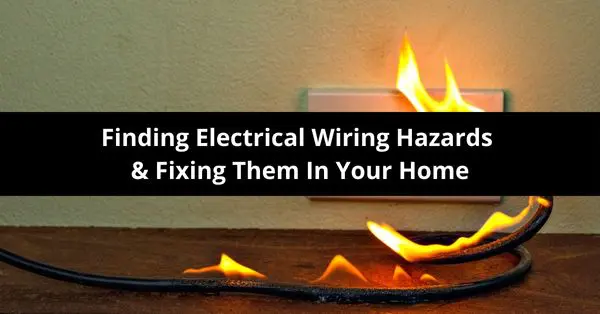If you hear buzzing when you switch a light on, or your outlets are hot to the touch, your home likely has some electrical wiring issues. Faulty wiring is a risk because more than 50,000 preventable house fires happen each year due to bad or old electrical wiring. It is important to have an electrical inspection on your home every five to 10 years, especially if your home is more than 40 years old. If you don’t have it checked and updated, you risk losing your house to an electrical fire, and everything inside it.
If you want to be extra cautious, then you can do mini inspections on your own each year, and perform maintenance on many of the issues. Some are making sure you don’t overload circuits with appliances and electronics that use too much electricity, and others are making sure you don’t overwhelm an outlet with multiple power strips. But the most important ones are the fault wiring issues inside your walls.
The table below walks you through some of the most common signs you have a wiring problem, and then we go into how to address them.
| Problem | Call Licensed Electrician | Turn Off Circuit | Replace |
| Fuses rated above 20 amps | X | X | |
| Getting shocks | X | X | |
| Hot outlets | X | X | |
| Bad cords and plugs | X | ||
| Flickering lights | X | ||
| Loose outlets | X | X | |
| See rodent droppings | X | ||
| Hear buzzing | X | X | |
| Smell smoke | X | X |
You Have Fuses Rated Above 20 Amps
For most homes, fuses should be rated at either 15 or 20 amps if you have a 60 amp service (this will look like a panel box with four fuses in it). The amps on the four fuses (the amps for each fuse is listed on the fuse itself) added together should not equal over 60 amps.
Fuses that continuously blow indicate that you have a problem with your electrical system, or that you have the wrong amps. In many cases, homeowners will put in a larger fuse to stop it from happening again, this is called over-fusing, but that is not a solution. It doesn’t reduce the risk of the fuses starting a house fire from being over-fused.
Over-fusing allows too much current (too many amps) to flow through the electrical wires in your home. Within 15 seconds an overworked fuse can turn into a house fire making it a massive risk. The fire is caused when the heat ignites the insulation and dust inside your walls and ceiling.
To avoid over-fusing add up the amps and make sure you don’t pass the maximum mentioned above. If they are over it, reduce a 20 to a 15 until it is under or equal to the maximum amount. i.e. if you have a maximum of 60 amps and four 20 amp fuses, change each of the 20 amp fuses for 15 amp fuses and you’re now at 60 amps.
You Get A Shock When Touching Anything Metal
If you get a minor electric shock when you plug something in, touch a metal outlet faceplate or screws, or if you only have two pronged outlets, your electrical system is likely not properly grounded.
The main purpose of a grounded outlet is to prevent electric shock, so if electricity leaves the outlet, it goes into the ground and not you. Ungrounded outlets only have connections for a hot and neutral wire where three-prong outlets have connections for a grounding wire. Without a grounding wire, there is no safe path for electricity to travel if there is an unstable current like in a power surge.
These outlets increase the risk of:
- Electric shock because without the third grounding wire, the outlet and breaker box are charged which makes electrocution more likely.
- Without a ground wire, any issues with outlets can cause sparks or arcing which then catch walls or nearby furniture on fire.
- Ungrounded outlets can damage appliances by causing them to short out.
The best way to fix ungrounded outlets is to add a ground wire to make a path for the electricity to get back to the main electrical panel. You can also swap the ungrounded outlet with a GFCI outlet to provide protection from shocks and surges. A sticker will need to be added to the GFCI outlet that reads “No Equipment Ground” (which comes with every GFCI outlet). A licensed electrician normally does this as it can be dangerous to do on your own.
Your Outlets Are Hot to the Touch
Identifying why your outlet is hot can be tricky, but it’s usually one of the following reasons: faulty wiring, too many items plugged into an outlet, overloaded circuits, and faulty plugs and cords. If you do not have power strips or multiple electronics plugged into your outlets, check the circuits with a multi-meter to measure the voltage. From there you’ll want to see how much electricity you were forcing through the outlet. You may have been overworking it unintentionally.
The better bet is to call an electrician. Overworked outlets are a fire hazard and the cost of losing your home is much less than a visit to have your outlets checked.
Faulty Wiring
Loose wiring and corroded wires (from aging materials) can cause bad connections which results in extra heat building up in your outlet. Sometimes you may even see sparks when you plug things in! Another sign of faulty wiring is that your light bulbs keep burning out immediately when you replace them.
If you find a hot outlet, unplug all the cords to that outlet, find the circuit breaker for that outlet and turn it off, and then call a licensed electrician to decide if you just need a new outlet or new electrical wiring. Some people are DIYers, and there are plenty of tutorials online. But when it comes to your home and family heirlooms, it is often best to leave it to a professional. There are a million things that can go wrong, and they’ll be able to patch holes in the wall and repair damage, while making sure the wiring is updated, reducing the amount of work you have to do.
Flickering Lights
Flickering lights aren’t usually ghosts, they’re likely the result of a loose electrical connection. If the lights in your whole house flicker, the issue could be with your breaker box or outside of your home.
Contact a licensed electrician (if it’s only occurring in 1-2 rooms) or your local utility (if it’s your whole house) to troubleshoot for you, because these are not repairs you can make on your own. And good news, your homeowners insurance policy may cover the cost of repairs, especially if the breaker box was damaged by nature (storms, rain, tornadoes, etc…) or if it was recently checked by a licensed professional and reported back as being up-to-date on the latest electricity code requirements.
Loose Outlets
If a plug slips in and out of an outlet a little too easily, or the outlet pulls out of the wall when you unplug things, the outlet is loose. A loose outlet eventually will shake its wires free which creates shorts and sparks and causes it to overheat.
Loose outlets leave power cable cords vulnerable to deterioration too, because the wires in the wall can be rubbing against anything resulting in heat build-up. This can cause issues with your electrical wiring and put your dream home at risk of an electrical fire.
Fixing a loose electrical box is more than just tightening a few screws. The outlet box will need to be replaced or the holes in the wall stud will need to be resized. This can be done by yourself if you are careful and trained on how. But you will be responsible for fires afterward and still need an inspection. You’ll also have to fix the holes in your walls that are made when replacing and repairing the outlets. This is why the cost of a licensed professional outweighs the money you save being a DIY homeowner.
Rodent Activity
If you see a rat, chipmunk, squirrel, or signs there is a mouse infestation, you likely need to have an inspection done on your home. Rodents have teeth that never stop growing so they are constantly chewing on things to sand their teeth down. This leads rodents to gnaw on your electrical wiring because of the wires’ round shape. Rodents will keep gnawing on your wiring until its bare and the exposed wires can then spark or overheat starting a fire.
Signs that rodents have damaged your wiring are:
- Visible bite marks on wiring and cables
- Scratching sounds behind your walls
- Nests
- Droppings
- A burnt, decay smell (indicating a dead/electrocuted rodent)
- Sightings of rats and mice in your home
If you see any rodent activity near your home’s wiring or the signs above, replace the damaged power cords and wires. You’ll also want to get rid of the infestation as it can lead to health hazards and if left unattended, damage the frame and structure of your home.
When You Hear Buzzing
You’ve probably heard a hum/buzz when your fridge cycles on, or when you’ve walked under high-voltage power lines or near electrical transformers. That’s called a “mains hum” or “mains buzz” and basically turns into white noise in your life.
Some of the buzzing you may hear at home is:
- Mains buzz
- If the mains hum gets a lot louder, contact an electrician right away.
- Outlets or switches
- Three issues can create buzzing from an outlet or switch: a loose wire, an overloaded wire, or an improperly grounded wire.
- Light fixtures
- A buzzing light fixture usually just needs a new bulb especially if it’s on a dimmer switch.
- Circuit breaker
- When circuits get overloaded and can’t turn off, they make a buzzing noise. Buzzing at the circuit breaker can also be an electrical arc. Both are dangerous, so a licensed electrician should troubleshoot.
Not all buzzing sounds are fire hazards, but if they are on outlets and circuit breakers then you could be at risk. Call a professional to assist if this is where your buzzing noises are coming from. They’ll be able to asses the risk and provide you with a solution.
Smelling Smoke
Electrical components like switches, sockets, and fuses can give off an electrical burning smell and usually indicate a problem that shouldn’t be ignored.
You can smell smoke because:
- Overloaded circuits cause electrical wiring to overheat and melt
- Loose wires rubbing against each cause the wires and the circuit to heat up and melt
- A short circuit
- Overheating due to faulty wiring
- Malfunctioning electrical connections
- Faulty sockets and electronic switches that allow wires to touch each other when turned on causing the wiring to melt
Knowing the most common electrical wiring hazards to look for is one of the best ways to help prevent a fire or shock from occurring in your home. While some of these fixes are easy and you can do them yourself, there are many, for safety reasons, for which you should contact a licensed electrician who is trained to remove these risks. If you live in an older home, or have a rental property where the costs outweigh the benefits of fixing them, you can try using a real estate agent to sell the property, or sell your home for cash to a real estate investor like us. We buy houses with electrical problems regularly so we know how to fix the damage and you won’t have to foot the repair bill.


